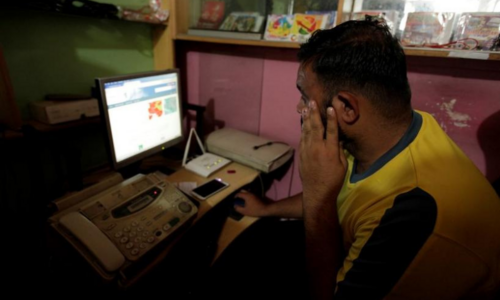• Reports paint abysmal picture of press freedom
• Claim journalists subjected to online harassment
• Many face cases under PECA’s criminal defamation section
ISLAMABAD: Media in Pakistan works within an increasingly repressive environment with attacks on press freedom coming from all fronts and space for free expression continuously shrinking.
This abysmal situation was highlighted in three reports released in connection with the ‘International Day to End Impunity for Crimes against Journalists’ which is observed on Nov 2.
In the first report prepared by the Pakistan Press Foundation (PPF), titled ‘Online harassment of the media in Pakistan’, it was stated that journalists were often on the receiving end of hate, threats and abuse from a range of individuals.
“Certain journalists have suffered the repercussions of their active presence online with abductions and registration of cases,” it said, adding that while online harassment continued, the push for legislation to control social media and the criminalisation of content online had become a tool to harass media.
In August 2020, women journalists had issued a joint statement against the “vicious attacks through social media” they endured.
In September, senior journalist and NewsOne anchorperson Gharidah Farooqi as well as Benazir Shah were victims of an online campaign, while in October, senior journalist Asma Shirazi, who had written a column for BBC Urdu, was met with scorn from both PTI supporters and ministers.
“The past year has seen the continuation of trends to threaten and intimidate journalists online. While both private individuals online and members of the government continue to participate and initiate trends against certain media professionals and organisations, there is also an increased focus on setting up rules for social media platforms,” the report said.
The other report prepared by the PPF, titled ‘Attacks on Media in Pakistan January-October 2021’, deplored the shrinking space for free expression in Pakistan.
The PPF observed an alarming trend during 2021 when not only physical attacks against media continued with impunity but the state level push to restrict free expression also grew.
The PPF recorded at least 27 incidents where media personnel were physically assaulted in connection with their work, including both armed attacks and beating of journalists.
However, in a positive development, on June 28, the Sindh Assembly passed the landmark ‘Sindh Protection of Journalists and Other Media Practitioners Bill 2021’. Another bill was presented in the National Assembly but it has yet to be passed.
The third report, a research study titled ‘Criminalising Online Dissent through Legal Victimisation: Impunity against Journalists Prosecuted under the Prevention of Electronic Crimes Act (PECA)’ by media rights watchdog Freedom Network, stated that a chilling pattern had emerged in the use of the criminal defamation section of Pakistan’s anti-cybercrimes law, PECA.
The study revealed that cases were registered against 56 per cent of the two dozen Pakistani journalists and information practitioners who had a brush with PECA between 2019 and 2021.
Out of these individuals who were formally charged under PECA, around 70pc were arrested. Just over half of the arrested were allegedly subjected to torture in custody.
The report’s findings are based on the analysis of cases of 23 journalists and information practitioners who were either sent notices by the FIA under PECA or charged with offences under the same law during the period between 2019 and 2021.
The analysis was done on data provided by these 23 journalists and information practitioners through a special impunity measurement template based on the comprehensive Impunity Index developed by Freedom Network.
The executive director of Freedom Network, Iqbal Khattak, said Pakistani journalists were increasingly using online spaces to share independent news and critical commentary that were suppressed on traditional media.
“It was unacceptable for democratic societies to criminalise dissent and enforce victimisation through arrests and torture of journalists, which must stop forthwith, and which contributed to Pakistan’s abysmally low ranking on global freedom of expression index,” he said.
Published in Dawn, November 1st, 2021














































